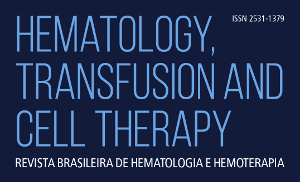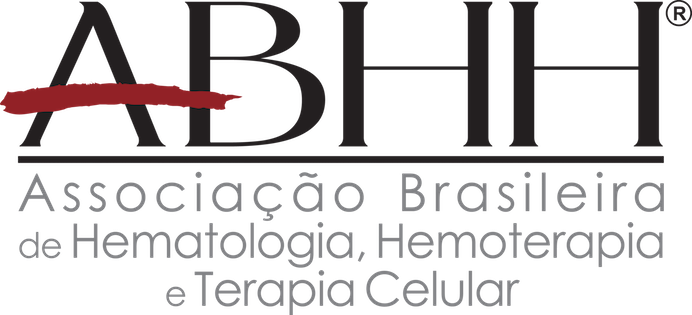|
|
-
Alfredo Mendrone Junior - Fundação Pró-Sangue, Hospital das Clínicas da Faculdade de Medicina da Universidade de São Paulo (FPS/FMUSP), São Paulo, SP, Brasil, ORCID: 0000-0002-3090-4575
-
Behnaz Bayat - Justus-Liebig University Giessen – Germany, ORCID: 0000-0002-5608-4317
-
Belinda Pinto Simões - Instituto Gonçalo Moniz (IGM) da Fiocruz-Salvador, BA, Brazil, ORCID 0000-0003-4508-8934
-
Carlos Sérgio Chiattone – Faculdade de Ciências Médicas da Santa Casa de São Paulo (FCMSCSP), São Paulo, SP, Brasil, ORCID: 0000-0002-4639-2578
-
Cármino Antonio de Souza – Faculdade de Ciências Médicas da Universidade Estadual de Campinas (Unicamp), Campinas, SP, Brazil, ORCID: 0000-0001-8656-8374
-
Dante Mário Langhi Junior – Faculdade de Ciências Médicas da Santa Casa de São Paulo (FCMSCSP), São Paulo, SP, Brasil, ORCID: 0000-0002-4642-8091
-
Dimas Tadeu Covas – Faculdade de Medicina da Universidade de São Paulo (USP), Ribeirão Preto, SP, Brasil, ORCID: 0000-0002-7364-2595
-
Douglas Silveira King's College London, Myeloid Leukemia Genomics and Biology Group, Londres, Reino Unido, ORCID: 0000-0001-5298-9592
-
Elvira Deolinda Rodrigues Pereira Velloso - Universidade de São Paulo, Faculdade de Medicina da Universidade de São Paulo (FMUSP), São Paulo, SP, Brazil, ORCID: 0000-0002-9707-0579
-
Fabíola Traina -Universidade de São Paulo Faculdade de Medicina de Ribeirão Preto (FMRP USP), Ribeirão Preto, SP, Brazil, ORCID: 0000-0003-4258-289X
-
Helio Moraes Souza, Universidade Federal do Triângulo Mineiro (UFTM), Uberaba, MG, Brasil, ORCID: 0000-0001-8049-348X
-
Henrique Bittencourt, Centre Hospitalier Universitaire Sainte-Justine Departement de Hematologie - Oncologie, Montreal, Canadá, ORCID: 0000-0002-5507-8310
-
Irene Lorand-Metze – Faculdade de Ciências Médicas da Universidade Estadual de Campinas (Unicamp), Campinas, SP, Brasil, ORCID: 0000-0002-6516-1265
-
Jane S. Hankins, MD- St Jude Children's Research Hospital, Memphis, EUA, ORCID: 0000-0003-4439-7321
-
José Orlando Bordin – Escola Paulista de Medicina -Universidade Federal de São Paulo (Unifesp) São Paulo, SP, Brasil, ORCID: 0000-0002-0324-6175
-
Kleber Yotsumoto Fertrin, Divisão de Hematologia da Universidade de Washington, Seattle, EUA, ORCID: 0000-0003-2637-3297
-
Luis Fernando S. Bouzas – Instituto Nacional do Câncer (INCA), Rio de Janeiro, RJ, Brasil, ORCID: 0000-0002-6267-9448
-
Marcelo Pasquini – Medical College of Wisconsin, Wisconsin, USA, ORCID: 0000-0003-1579-2293
-
Márcio Nucci – Faculdade de Medicina da Universidade Federal do Rio de Janeiro (UFRJ), Rio de Janeiro, RJ, Brasil, ORCID: 0000-0003-4867-0014
-
Marcos Borato Viana – Faculdade de Medicina da Universidade Federal de Minas Gerais (UFMG), Belo Horizonte, MG, Brasil,ORCID: 0000-0001-9665-2115
-
Marcos de Lima – University Hospitals Case Medical Center, Cleveland, EUA, ORCID: 0000-0002-8568-4522
-
Margareth Castro Ozelo – Faculdade de Ciências Médicas da Universidade Estadual de Campinas (Unicamp), Campinas, SP, Brasil, ORCID: 0000-0001-5938-0675
-
Maria Helena Pitombeira – Faculdade de Medicina da Universidade Federal do Ceará (UFC), Fortaleza, Brazil, ORCID: 0000-0002-2440-4072
-
Maria Stella Figueiredo, Universidade Federal de São Paulo (Unifesp), São Paulo, SP, Brazil, ORCID 0000-0003-3977-9915
-
Marilda de Souza Gonçalves - Instituto Gonçalo Moniz (IGM) da Fiocruz-BA, Salvador, BA, Brazil, ORCID: 0000-0003-3000-1437
-
Marisa B. Marques - Departamento de Patologia da Universidade do Alabama em Birmingham, Birmingham, EUA, ORCID: 0000-0002-6689-7856
-
Nelson Hamerschlak – Hospital Israelita Albert Einstein, São Paulo, SP, Brasil, ORCID: 0000-0002-5140-5310
-
Nelson Spector – Faculdade de Medicina da Universidade Federal do Rio de Janeiro (UFRJ), Rio de Janeiro, RJ, Brasil, ORCID: 0000-0002-2733-9835
-
Nicola Conran – Faculdade de Ciências Médicas da Universidade Estadual de Campinas (Unicamp), Campinas, SP, Brasil, ORCID: 0000-0001-5726-7919
-
Paulo Sérgio da Silva Santos - Faculdade de Odontologia de Bauru, Universidade de São Paulo (FOB USP), Bauru, SP, Brazil, ORCID: 0000-0003-1280-0817
-
Roberto Passetto Falcão - Faculdade Medicina Ribeirão Preto, Universidade de São Paulo, São Paulo, SP, Brazil - ORCID: 0000-0002-2633-3909
-
Rodrigo Tocantins Calado – Faculdade de Medicina da Universidade de São Paulo, (USP), Ribeirão Preto, SP, Brasil, ORCID: 0000-0002-7966-6029
-
Sara Teresinha Olalla Saad - Universidade Estadual de Campinas, Faculdade de Ciências Médicas da UNICAMP, Campinas, SP, Brazil, ORCID: 0000-0003-0809-8068
-
Silvia Maria Meira Magalhães - Universidade Federal do Ceará, Hospital Universitário Walter Cantídio, Fortaleza, CE, Brazil, ORCID: 0000-0002-1725-1880
-
Vanderson Rocha – Churchill Hospital - Oxford University, Oxford, Reino Unido, ORCID: 0000-0003-0094-619X
-
Vania Tietsche de Moraes Hungria, Faculdade de Ciências Médicas da Santa Casa de São Paulo (FCMSCSP), São Paulo, SP, Brazil, ORCID 0000-0002-4327-1957
|
|

